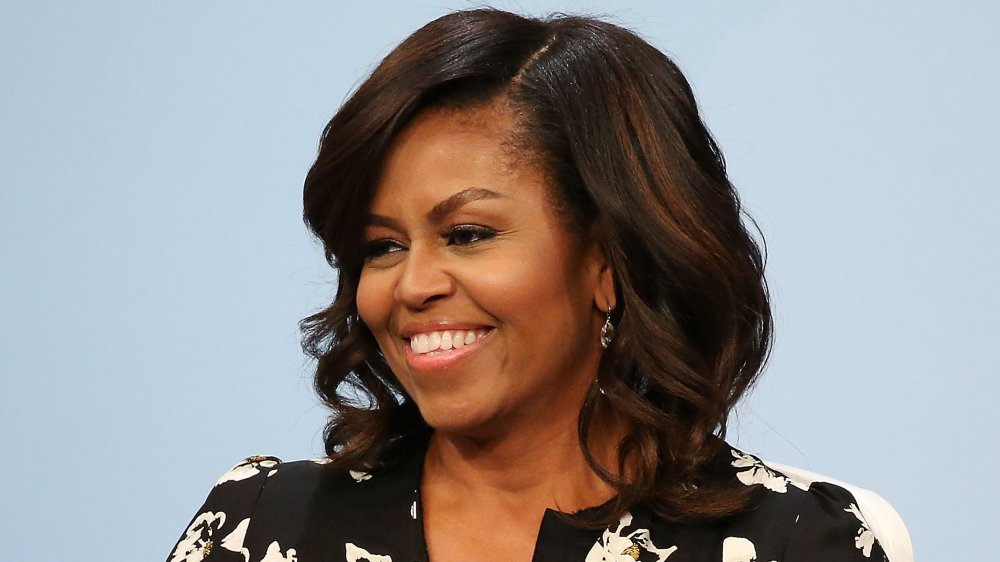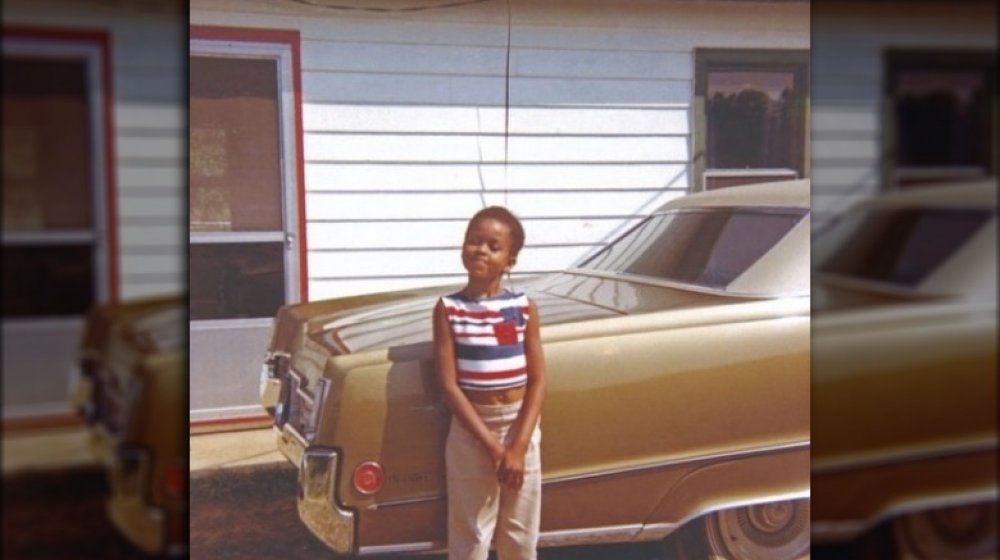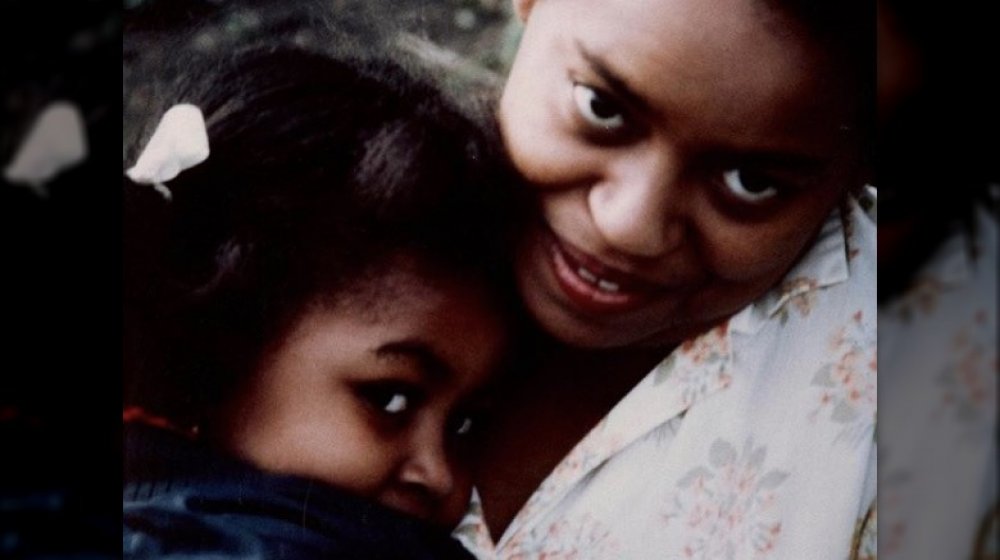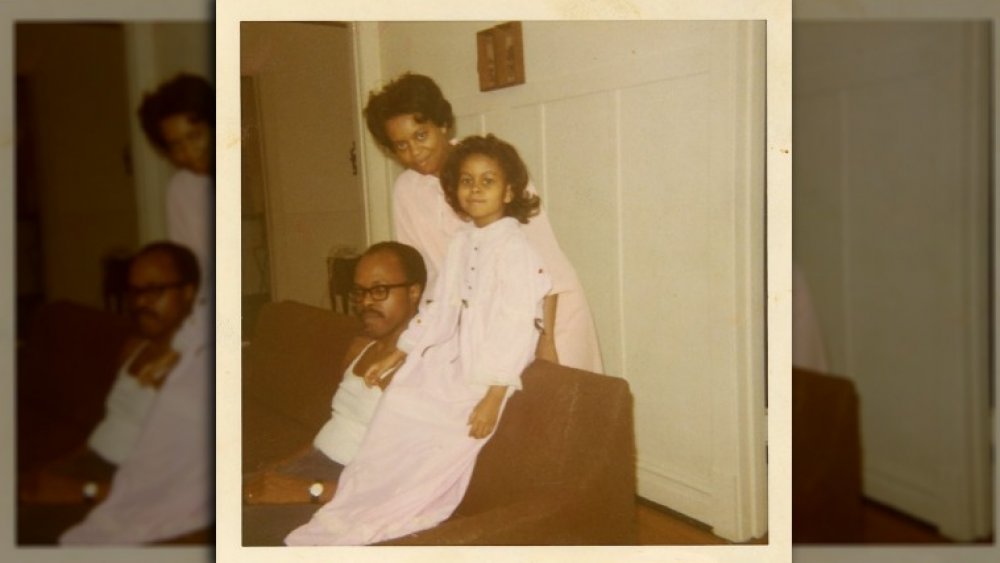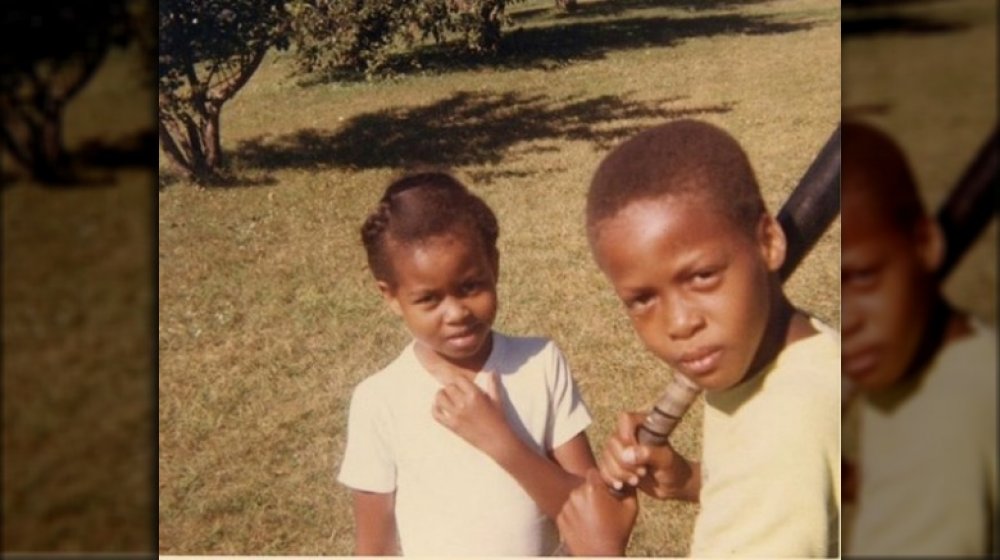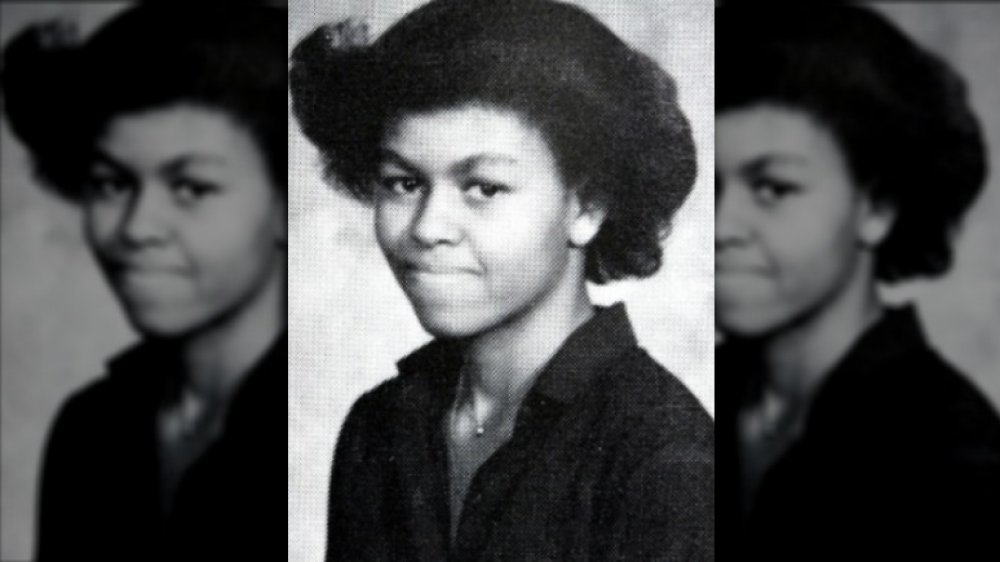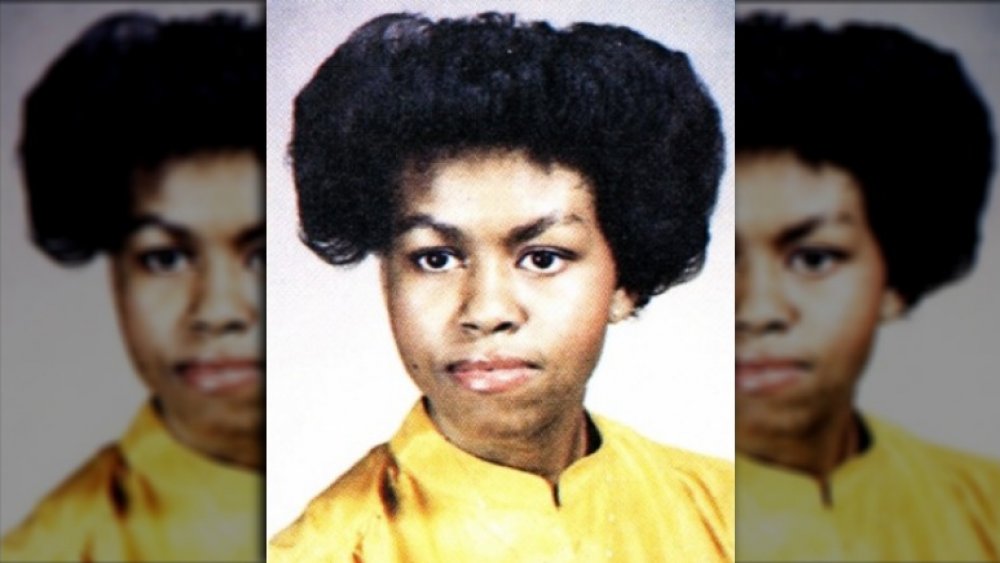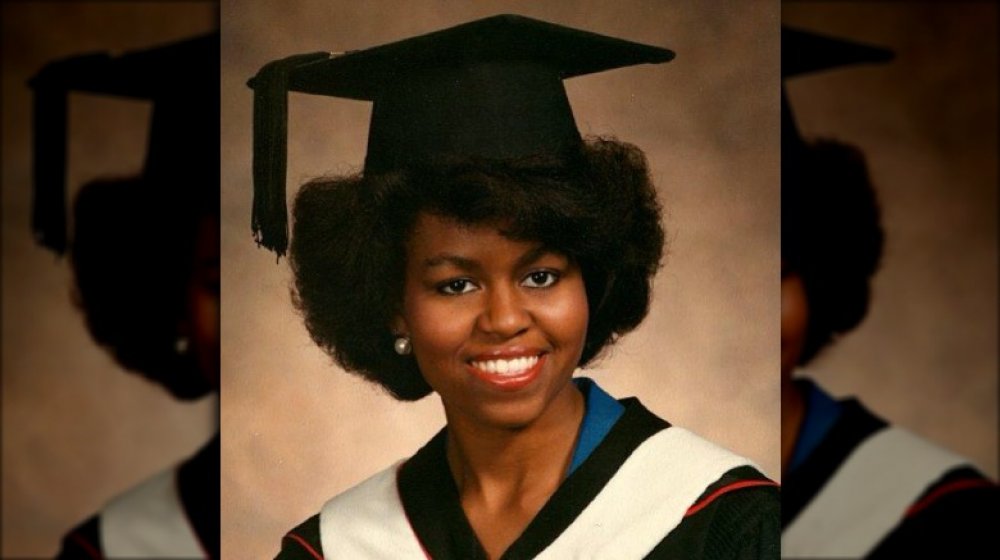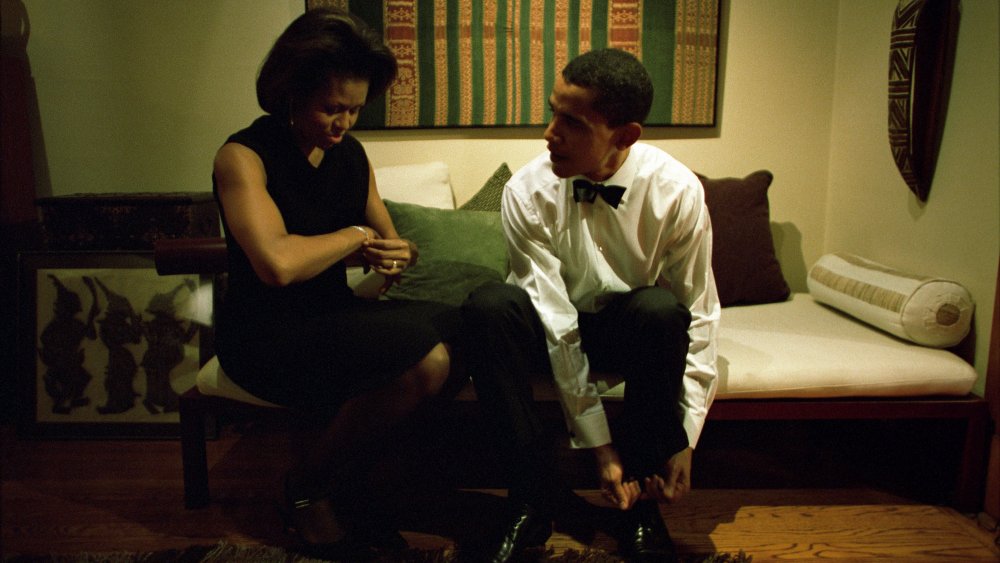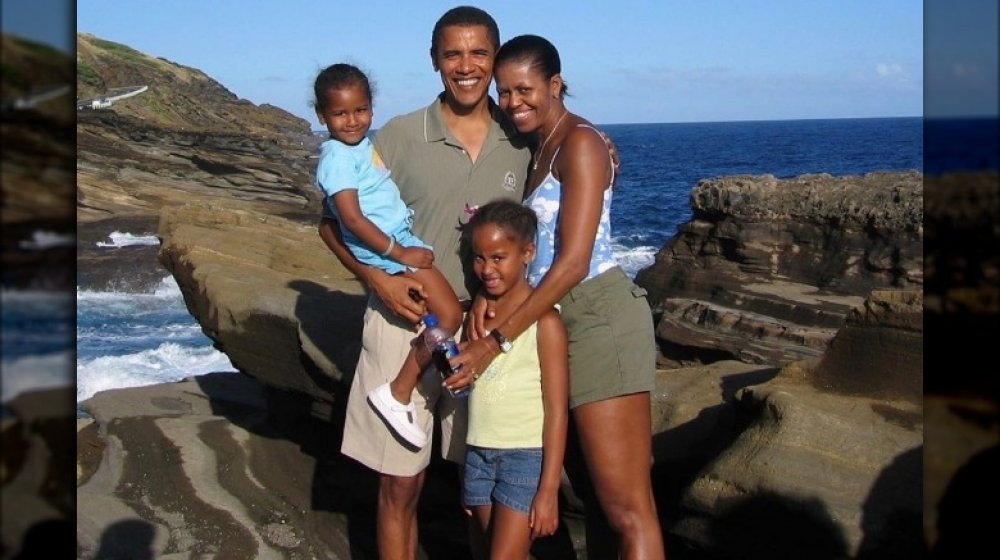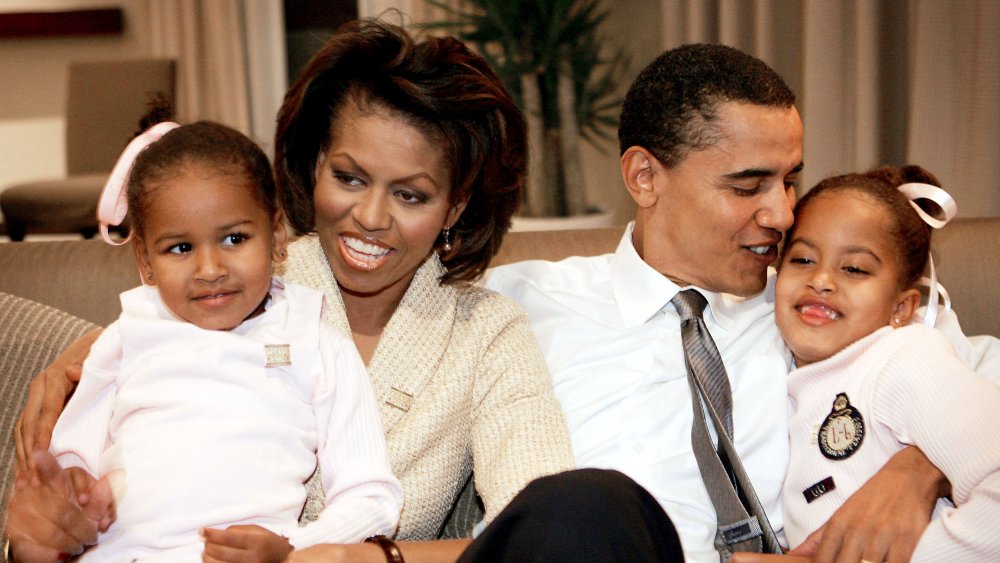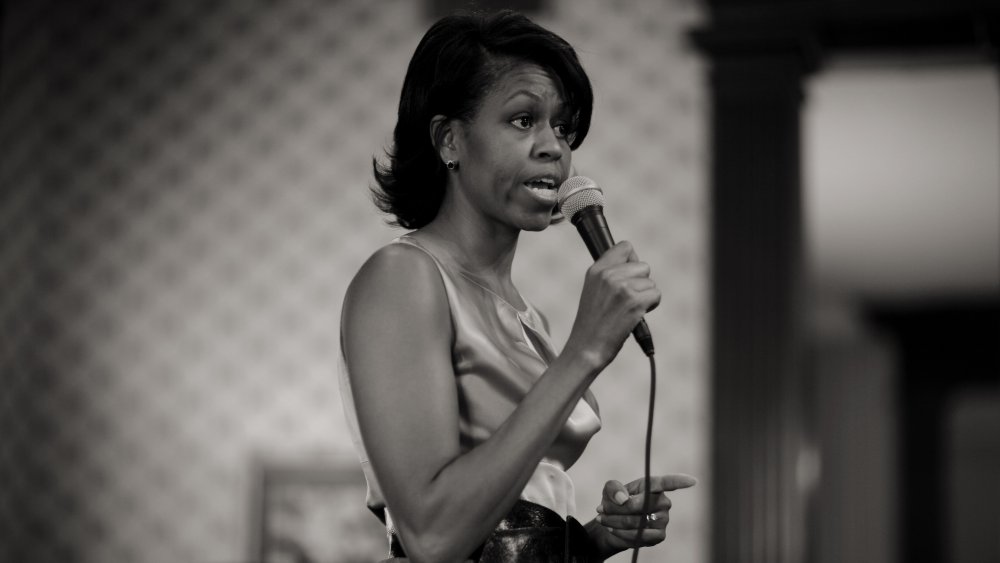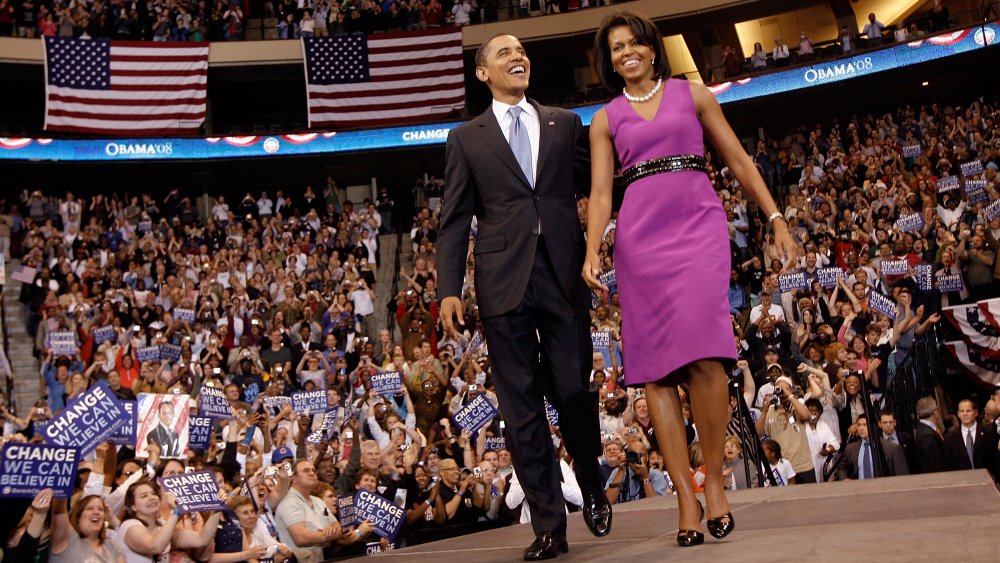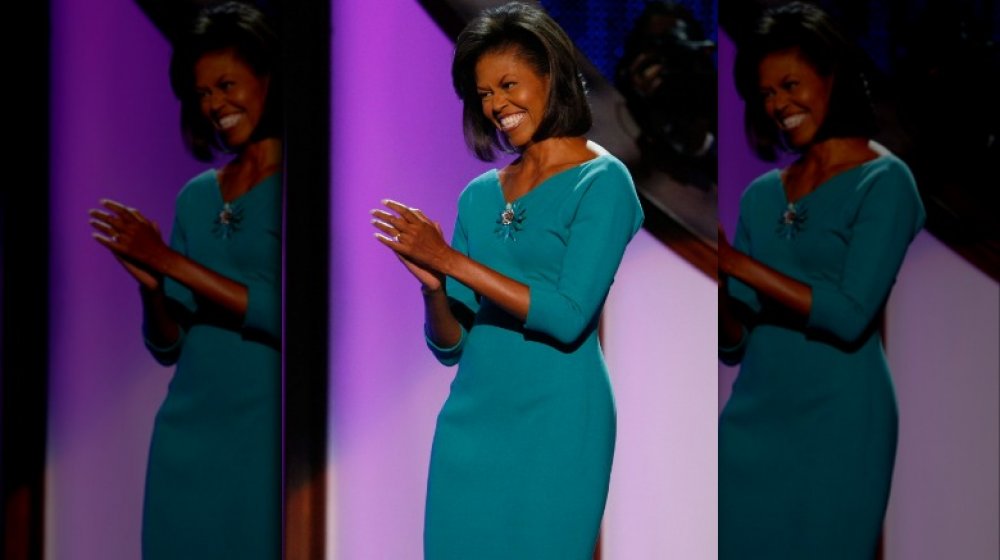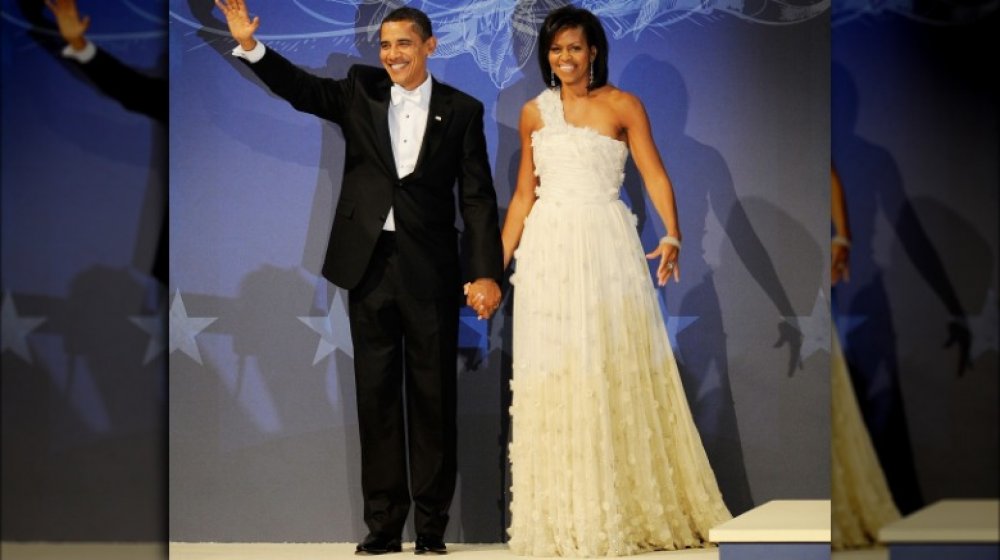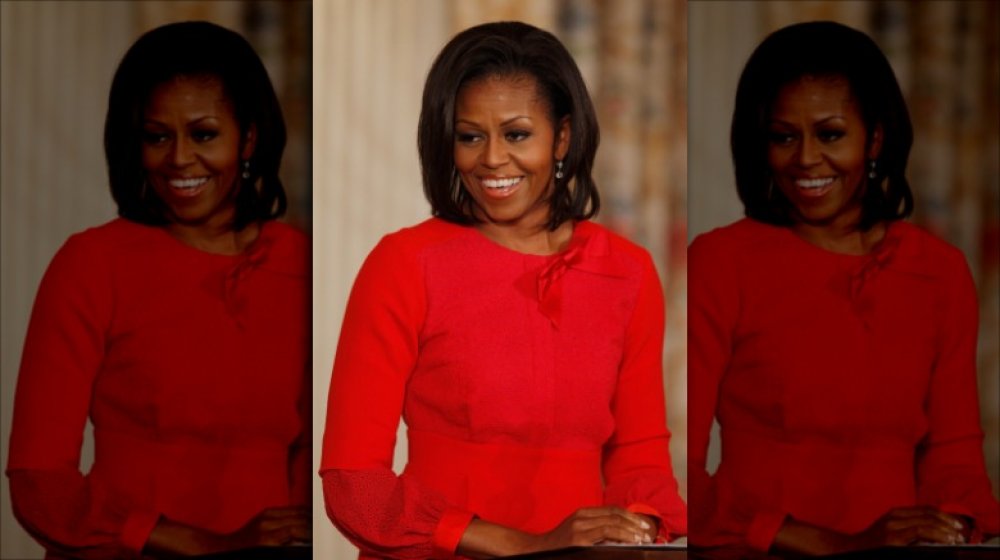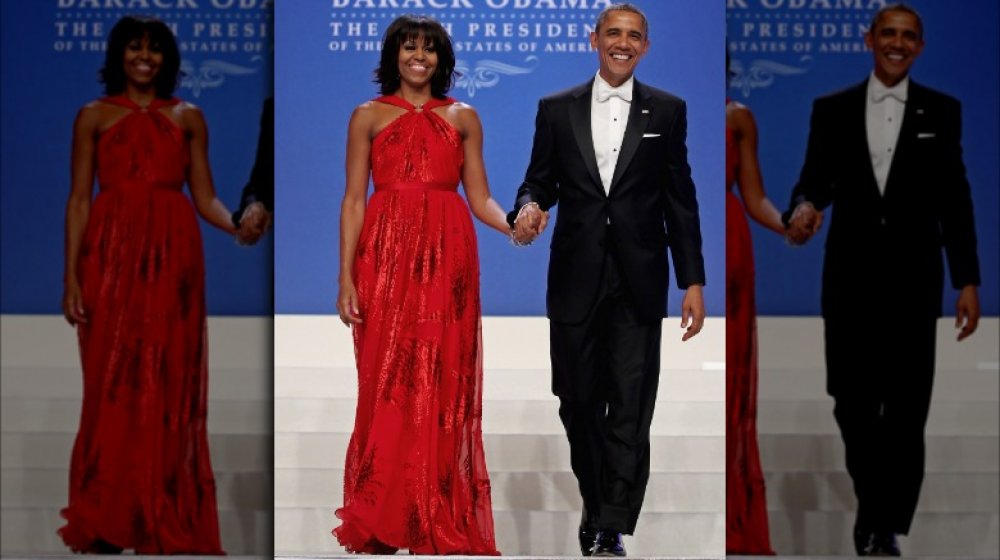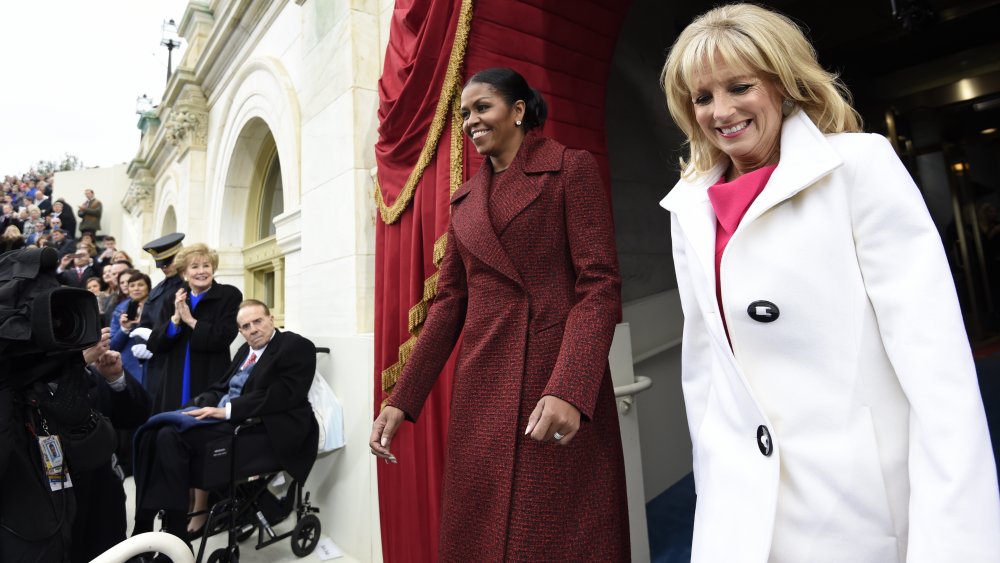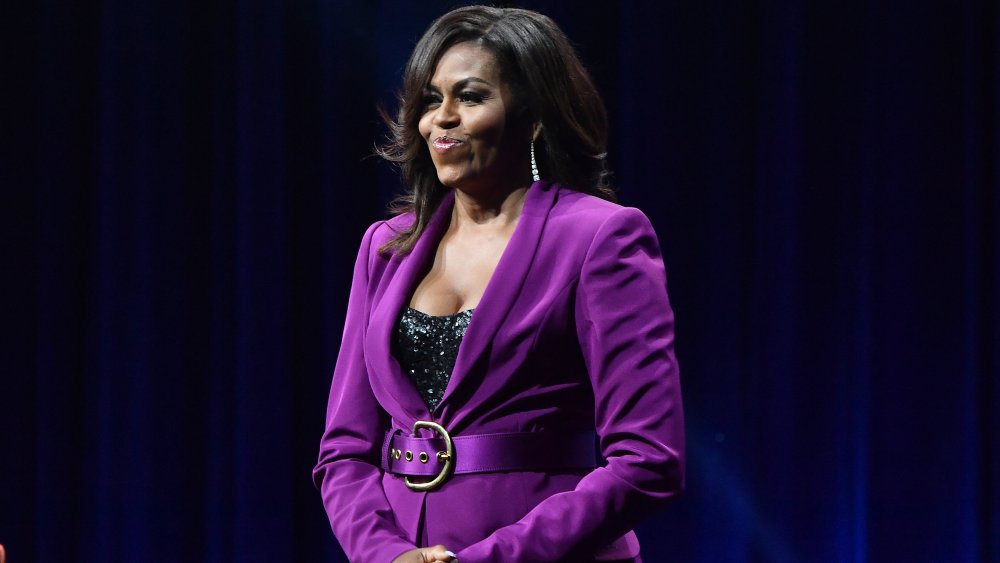The Transformation Of Michelle Obama From 6 To 56 Years Old
Michelle Obama, the wife of the 44th President of the United States, Barack Obama, led the nation in style and grace in the White House from 2009 to 2017. But for many Americans, Michelle is their "forever first lady," a role model who dedicated her life to public service. A graduate of not one, but two Ivy League universities, Michelle gave back to her hometown of Chicago as a working mom before decamping to Washington, D.C., where she affected change as first lady, a public figure admired for her smarts, poise and impeccable fashion sense.
But the road to the storied East Wing of the White House wasn't entirely smooth. From dealing with tragic loss to learning early on in life about society's harsh realities, Michelle has been a fighter from day one. This is the story of her remarkable evolution, from a girl from the South Side of Chicago into one of the most admired women in the world.
Michelle Obama's humble upbringings
Michelle Obama was born on January 17, 1964 in Chicago, the city she has continued to call home for most of her life. In her 2018 memoir Becoming, Michelle lovingly described her quaint family life. "I was just a kid, a girl with Barbies and blocks, with two parents and an older brother [Craig] who slept each night with his head about three feet from mine," she wrote. "My family was my world, the center of everything. My mother taught me how to read early, walking me to the public library...[and my father] showed us what it meant to love jazz and art." Describing her childhood home as a "cramped apartment on the South Side of Chicago," in a 2018 Instagram post, Michelle thanked her family for "[helping] me see the value in our story, in my story, and in the larger story of our country."
Mommy and Michelle
Michelle Obama and her brother Craig were raised in Chicago by their loving parents, Marian and Frasier Robinson. Marian (pictured above right) lived a long life as she watched her daughter ascend to national prominence, celebrating her 83rd birthday in July 2020. Michelle praised her mother in a 2018 letter for the Chicago Defender, describing Marian's commitment to her children's education. "My mother became one of the most active members of the PTA at Bryn Mawr, raising money for new equipment, throwing teacher-appreciation dinners, and lobbying for classes and strategies that would better serve the neighborhood's children," she wrote. Michelle further described her mom's independence-minded parenting style in a 2019 People essay, writing, "When it came to raising her kids, my mom knew that her voice was less important than allowing me to use my own. That meant she listened a lot more than she lectured."
The tragic loss of Michelle Obama's father
Michelle Obama's father, Frasier Robinson (above left), tragically passed away in 1991 at the young age of 55 due to complications from multiple sclerosis. In her 2018 memoir Becoming, Michelle described how the brutal disease affected his body when she was a child. "Before I finished elementary school, [his] cane would become a crutch and soon after that two crutches. Whatever was eroding inside my father, withering his muscles and stripping his nerves, he viewed it as his own private challenge, as something to silently withstand."
Michelle, who praised her father in a 2018 Instagram post as a man who "taught me to work hard, laugh often, and keep my word," described the pain of his death in a 2015 commencement speech at Chicago's Martin Luther King Jr. Preparatory High School. "Now, my dad didn't live to see me in the White House," she said. "He passed away from complications from his illness when I was in my twenties. And graduates, let me tell you, he is the hole in my heart. His loss is my scar. But, let me tell you something. His memory drives me forward every single day of my life."
Michelle Obama's brother Craig is his own superstar
Michelle Obama grew up in Chicago alongside her older brother Craig Robinson (above right), whom she honored in a 2019 Instagram post. "For as long as I can remember, my big brother Craig has always had my back," she wrote, adding, "He's still one of my best friends today." His sister may be the family's highest-profile name, but Craig Robinson has achieved considerable notoriety in the sports world. Robinson played basketball for Princeton, becoming one of the Ivy League's all-time most efficient scorers.
After years as a successful business executive, Robinson pivoted back to sports, coaching college teams before working with ESPN, the Milwaukee Bucks, and the New York Knicks, where he's helped lead the team since 2017 as the vice president of player development. Speaking to the New York Post in 2018, Robinson recalled playing a pick-up basketball game with his sister's then-boyfriend Barack Obama, and calling Michelle afterward to give Barack a good review. "I realized he wasn't selfish," Craig said. "He wasn't greedy. He showed character on the court. ... I was able to get back to [Michelle] and say, 'He seems like a pretty good guy.'"
A racial awakening awaited Michelle Obama in high school
Michelle Obama, seen here in her 1980 yearbook photo from Whitney M. Young High School, painted a picture of her years at "Chicago's first magnet high school" in her 2018 Becoming memoir. "The school was designed as a kind of equal-opportunity nirvana, meant to draw high-performing students of all colors," she wrote. The school's demographic reality, she recalled, was a different story: "When I attended, about 80 percent of the students were nonwhite."
Michelle became keenly aware of Chicago's racial disparities at a young age, looking back on her earlier school years in a 2018 Chicago Defender essay. "In kindergarten, my classroom had been wonderfully diverse, full of children of varying ethnic and economic backgrounds," she wrote. "In the span of just a few years, though, most of the better-off families left our neighborhood for the suburbs, and by fifth grade, almost every student in my class was Black. As "White flight" took off, prospects in South Shore fell. Observers began throwing around words like 'ghetto' to describe our neighborhood."
Michelle Obama proved she was 'Princeton material'
Michelle Obama, seen in a photo from her 1981 high school yearbook, had a transformative experience at Whitney M. Young High School, which brought her into contact for the first time with "an African American elite," as she wrote in her 2018 memoir Becoming. "My first months at Whitney Young gave me a glimpse of something that had previously been invisible — the apparatus of privilege and connection."
During her senior year, a formative encounter with a school guidance counselor, who told her she wasn't "Princeton material," lit a fire within Michelle to dedicate herself to following in her older brother's Princeton footsteps, with Michelle gaining admission to Princeton after all, writing her college admissions essay about her father's diagnosis of multiple sclerosis. "I never did stop in on the college counselor to tell her she'd been wrong – that I was Princeton material after all," she wrote in Becoming. "I hadn't needed to show her anything. I was only showing myself."
Princeton challenged Michelle Obama in uncomfortable ways
Michelle Obama headed to Princeton University in 1981, graduating in 1985 after publishing her senior thesis titled "Princeton-Educated Blacks and the Black Community." As her thesis topic suggested, Obama's Princeton experience was shaped by her race, as she described in a 2018 Instagram post, accompanied by a throwback photo of herself on the Princeton campus. "I was black and from a working-class neighborhood in Chicago, while Princeton's student body was generally white and well-to-do," she wrote. "I'd never stood out in a crowd or a classroom because of the color of my skin before."
From Obama's first days at Princeton, her race was a factor, with the Boston Globe publishing an interview in 2008 with Alice Brown, the mother of Michelle's freshman year roommate, who regretfully admitted that she attempted to find her daughter a new roommate when she realized that Michelle was Black. "No matter how liberal and open minded some of my White professors and classmates try to be toward me, I sometimes feel like a visitor on campus; as if I really don't belong," Michelle wrote in her thesis (via Politico).
When Michelle met Barack
Michelle Obama went on from Princeton to graduate from Harvard Law School in 1988, landing a job as an attorney at the Sidley & Austin law firm. Soon after she started, she was assigned to mentor a summer associate at the firm named Barack Obama. "He moved with a loose-jointed Hawaiian casualness," Michelle wrote in her 2018 Becoming memoir, remembering one of their first dates. "I counseled myself to slow down, just a little — just enough so that I could hear what he was saying, because it was beginning to dawn on me that I cared about hearing everything he said."
A relationship flourished and the two got engaged in 1991. Michelle and Barack married in 1992, with Michelle remembering in a 2018 Instagram post that "Barack woke up on our wedding day in October 1992 with a nasty head cold. Somehow, by the time I met him at the altar, it had miraculously disappeared and we ended up dancing almost all night."
Michelle Obama balanced careers and kids
Michelle Obama transformed her career after meeting Barack Obama at the Sidley & Austin law firm where they both worked, telling The Daily Princetonian (via Michelle Obama In Her Own Words) in 2005 that she felt compelled to leave corporate law for a more gratifying career path. "We both wanted to affect the community on a larger scale than either of us could individually, and we wanted to do it outside of big corporations," Michelle said about her and Barack's career goals. "It was not a 'make a lot of money, wrap it up and call it a day' thing."
Michelle went on to work for the Chicago mayor, Chicago's Office of Planning and Development, and the University of Chicago before rising to a vice president position at the University of Chicago Hospitals. Michelle and Barack also became parents in their first decade as husband and wife, welcoming daughters Malia and Sasha in 1998 and 2001, respectively.
Becoming a politician's wife
Michelle Obama's family life changed again in 2004, when Barack Obama, who previously served as a state senator in Illinois, ran to represent the state in the U.S. Senate. That same year, he delivered a widely-celebrated speech at the Democratic National Convention, before going on to win his Senate race in November.
In November 2004, Barack and Michelle spoke to Oprah Winfrey about their family's transformation, with Michelle describing her husband's acclimation to fame. "We're clear on the fact that we have to stay humble and prayerful," she said. "We have to dig down deep to our roots. When things come together, we know some of it is Barack, some of it is us — but a lot of it has nothing to do with either of us." Calling Barack "a great father," Michelle spoke about how Barack balanced his career with being a father, a task that would only grow more challenging in the following decades. "The first people we don't want to disappoint are our kids," she said. "Even when he's away, he calls every night. People will suck you dry, and they don't think about the fact that you have two kids."
Michelle Obama on the trail
In February 2007, Barack Obama officially announced his campaign for the president of the United States at a rally in Springfield, Ill., with Michelle Obama and their two daughters by his side. Michelle hit the campaign trail in 2007 (shown above at an event in Council Bluffs, Iowa) to support her husband, making the controversial choice to scale back her work schedule to devote more time to Barack's presidential aspirations. "I know who I am," she told The Los Angeles Times in 2007 about her decision. "I'm a grownup now. Maybe if I were 20 going through this, it would be hard. But these discussions aren't about me. I know why I made my choices. I know what I need to sustain myself, and Barack is the same way." Michelle's decision paid off for the campaign, as she won praise from Democratic women for her pro-working mom messaging.
Criticism weighed heavily on Michelle Obama
Michelle Obama, seen here onstage with Barack Obama in June 2008, encountered her fair share of pitfalls during her husband's first campaign for president. In a February 2008 speech that went viral for all the wrong reasons, she infamously declared, "For the first time in my adult life, I am really proud of my country, because it feels like hope is finally making a comeback."
Looking back on the challenges of Barack's first campaign, Michelle told Oprah Winfrey in a 2016 CBS This Morning interview that those years brought her first experiences with the "angry Black woman" slur. "That was one of those things that you just sort of think, 'Dang, you don't even know me, you know?'" Michelle said about the term. "You think, 'That is so not me.' But then you sort of think, 'Well, this isn't about me. This is about the person or the people who write it.'"
Michelle Obama's turning point
As the 2008 U.S. presidential campaign wore on, Michelle Obama, seen here onstage at the 2008 Democratic National Convention, was increasingly praised for her campaign performances. "There was this perception that she was a problem for the campaign," Vanderbilt University professor Bonnie Dow told the BBC of Obama at the time, adding, "The outlines of that problem are so easily tied to negative stereotypes about African-American women — that they are matriarchal, pushy loud."
By the time of the Democratic National Convention, though, Michelle's public perception had improved, with The Washington Post calling her DNC speech a "major turning point" for her. Dow apparently concurred, telling the BBC, "When we go into the DNC [and] she gives this speech, introducing the president by saying 'I stand here as a wife, mother, daughter, sister,' you see the beginnings of a very purposeful rehabilitation of this image."
First Lady at last
On November 4, 2008, Michelle Obama celebrated Barack Obama's victory over John McCain to become President of the United States. "This entire year and a half has brought us closer together as a family," Michelle told 60 Minutes in a post-election interview in November 2008. "And we managed to stay close and become even closer with Barack gone most of an entire two year period. And now we get to be together under the one roof, having dinners together. And, you know, I envision the kids coming home from school and being able to run across the way to the Oval Office and see their dad before they start their homework. And having breakfast. And he'll be there to tuck them in at night." It didn't take long for Michelle to begin stunning the nation as first lady, wearing an ivory Jason Wu gown to Barack's inaugural ball (shown above) in 2009.
Michelle Obama's tenuous first term
Michelle Obama, seen here in 2011, spent her first term as first lady acclimating to life in the White House while advocating for initiatives under her purview, including the Let's Move program to advance childhood nutrition and the Joining Forces campaign to support military families. According to a 2012 New York Times profile, Michelle felt considerable pressure as the nation's first Black first lady to execute her job flawlessly, and felt "everyone was waiting for a black woman to make a mistake," per a former aide.
Speaking to Good Housekeeping in 2012, shortly before the 2012 presidential election, Michelle said Barack helped her learn to use "optimism" to adapt to the pressure of the office. "He knows that sometimes things get confusing, but folks want to do the right thing and figure it out. When you operate from that vantage point, it's easy to not take [criticism] personally. You can hunker down and get the work done. He helps me keep focused when I'm feeling off-center."
The Obamas return to the White House
Michelle Obama spent 2012 soldiering through Barack Obama's reelection campaign and winning high marks from the press. In fact, CNN called her 2012 Democratic National Convention speech "one of the finest speeches ever delivered at a national political convention," with the power to "change history" for the Obama campaign. Michelle, speaking to CNN before an Oct. 3, 2012 debate that unfortunately fell on hers and Barack's 20th wedding anniversary, joked that "attending a presidential debate on my 20th anniversary is probably the worst way for me to spend [it] ... I get so nervous at these debates." Thankfully for Barack and Michelle, the Obamas secured a second presidential term in the 2012 election, with Michelle wearing another Jason Wu gown — this time a flowing red number — to the 2013 inaugural ball (pictured above).
Out with the Obamas, in with Trump
Michelle Obama's time as first lady officially came to an end in 2017, when she and Barack Obama left the White House to make room for the incoming Trump Administration. Michelle, seen above with Jill Biden on President Trump's inauguration day in January 2017, thanked her supporters in her final speech as first lady the week before Trump's inauguration, tearing up as she told the young people listening (via CNN) that "they matter, that they belong," adding, "Don't be afraid. Be focused. Be determined. Be hopeful. Be empowered. Empower yourself with a good education. Then get out there and use that education to build a country worthy of you boundless promise."
Looking back on Trump's inauguration during and appearance on The Tonight Show with Jimmy Fallon in 2018, Michelle quoted the classic film Friday to describe her feelings that day. "Bye, Felicia!" she quipped, adding, "A lot was going on that day. That was a day."
Michelle Obama's 'Becoming' was a booming success
In 2018, Michelle Obama published her memoir Becoming, embarking on a globe-spanning book tour that would become the basis of her 2020 Netflix documentary of the same name. By March 2019, Becoming had sold 10 million copies, with book's publishing group, Bertelsmann, announcing that the title could become the best-selling memoir of all time. Speaking to Oprah Winfrey shortly after the book's release in November 2018, Michelle told her longtime friend that she wasn't afraid to reveal her private life in the book. "People always ask me, 'Why is it that you're so authentic? How is it that people connect to you?'" Michelle explained. "And I think it starts because I like me. I like my story and all the bumps and bruises. I think that's what makes me uniquely me."

